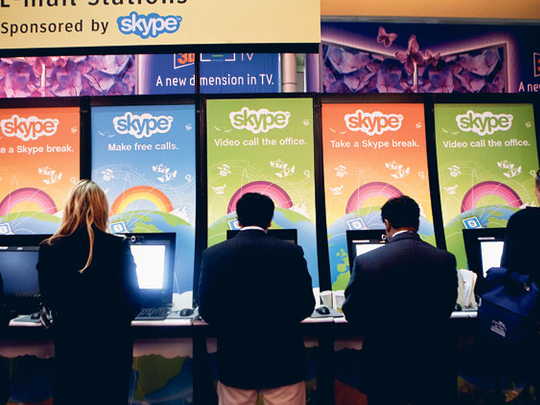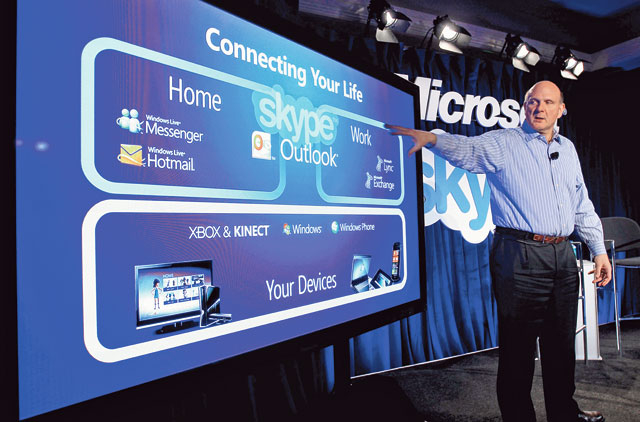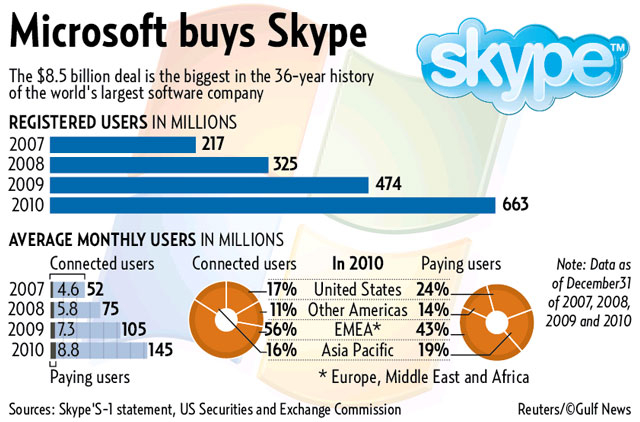
Dubai: As news of Microsoft's $8.5 billion acquisition of Skype spreads, questions are being raised once again about the legality of video calling on computers and mobile phones.
Skype is an immensely popular VoIP (voice over Internet protocol) software platform with global expatriates for its ability to place international calls between computers and handsets at no cost.
But for years Skype has been blocked in the UAE by telecoms operators which derive a large portion of their revenues from international calls placed by their customers.
Asked for clarification by Gulf News yesterday on whether Skype is still deemed illegal, the Tele-communications Regulations Authority (TRA) issued a revised copy of its policy noting that only licensed operators can engage VoIP services.
The TRA's VoIP Policy of December 2009 describes video calling as "a service that allows transmitting, receiving, delivering and routing of voice telecommunications by means of internet protocol."
It further states that "no person may engage in a regulated activity such as the provision of public telecommunications services unless licensed to do so in accordance with the telecommunications law.
Currently, etisalat, du and Star Communications are the only entities which are licensed to provide, retail VoIP services to subscribers in the UAE."
Mohammad Al Ganem, director general of the TRA, said in a statement last December that "only the telecom service providers in the UAE are licensed to offer VoIP services and they have started to provide these services already."
"We have been working with Skype and other VoIP providers to see if their services could be established here in the UAE," he said.
The position reflects a WAM press release in March last year which noted that the "TRA regulatory framework is technology neutral and the TRA does not prohibit VoIP as a technology."
In a subsequent interview with Gulf News, a senior Skype official said the global video phone services provider based in Luxembourg was not in any negotiations with the UAE.
"Skype is not in discussions with the UAE's TRA," said Rouzbeh Pasha, Skype's Head of Middle East and Africa in December.
"Generally speaking, we're always excited when people use Skype regardless of where they are. Skype connects people from all around the world through video and voice calls via multiple mobile devices," Pasha said.
"All you need to use Skype is the Skype software and an internet connection. It is that easy."
Pasha said the Middle East has lots of potential for video calling.
"If you look at the potential the UAE has, it is great. From our point of view, it's not really about any one country specifically. I'm in charge of a big region, [the] Middle East and Africa; it's 1.3 billion people with 300 million Arabic-speaking people," he said.
Dubai The new unification of Microsoft and Skype will have a positive impact on real-time communications, says Zaki Khoury, Microsoft's business manager for the Gulf.
"With this announcement, I'm pleased that together Microsoft and Skype will advance the state of real-time communications," Khoury told Gulf News.
Communications
"By combining the technologies and talent at Skype with Microsoft's long-standing focus and investment in real-time communications across its various platforms… the two companies will rapidly accelerate the value and deployments of communications worldwide."














